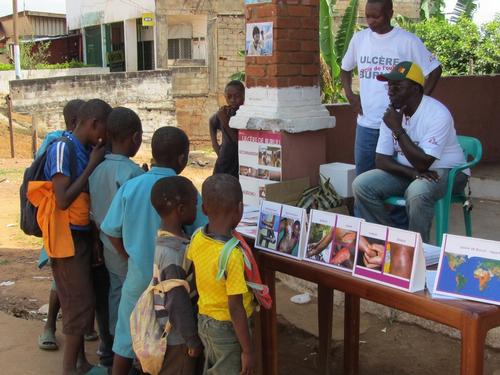- After 12 years of involvement in the treatment of Buruli ulcer in Akonolinga, Cameroon, Médecins Sans Frontières (MSF) has completed the handover of some of its activities to the Ministry of Health.
- The unique nature of the project has generated the interest of several partners, in particular the University Hospital of Geneva (HUG). This hospital will continue training medical and support staff in treating chronic wounds and wounds associated with Buruli.
- Eric Comte, former MSF Medical Director, and Hubert Vuagnat, Chief Physician of the Medical Rehabilitation Department at HUG, speak about the future of the project.
What is the future of the Buruli ulcer treatment project in Akonolinga?
Eric Comte: When I first joined MSF in 2005, we didn't know about Buruli ulcer. We can be proud of the work that has been done so far. Thanks to the dynamic of the teams in Cameroon and the cooperation with the HUG team, the wound care now provided in Akonolinga is of a very good quality. We've also expanded the programme to include chronic wounds, which has enabled us to treat many more people. But the real richness is having a motivated team that is trained in the treatment of wounds. Our team on the ground has developed strong ties with the universities in Yaoundé, which are now very involved in wound management.
Hubert Vuagnat: The first course on Buruli ulcer and chronic wounds was given by the Haute École de Santé of Geneva in 2008. Since then, we've run two other courses, mainly taught by Cameroonian lecturers under the direction of the University of Yaoundé.
Three further training courses are planned: one this year and two in 2015. From now on, we want the training to address chronic wounds first of all and then Buruli. While the ulcer is a problem in Akonolinga and in endemic areas, the number of cases is low compared with chronic wounds in Cameroon and worldwide. Through collaboration between the University of Yaoundé and HUG, the European Wound Management Association (EWMA) and the Swiss Association for Wound Care, we hope to establish a university qualification geared towards healthcare staff in Cameroon and the wider sub-region. We've seen that all healthcare staff encounter cases of chronic wounds and that they're not necessarily confident about treating them.
How does this course differ from what is already on offer at the University of Yaoundé?
HV: For now, wound care isn't taught in Cameroon. To my knowledge, the only wound care programme in the region is in South Africa. Our approach will offer a qualification made up of different modules. There will be a module taught in French on basic care, and a second seven-day module for more advanced wound care skills. Five days of work experience in Akonolinga will be a part of both modules. This centre is unique, because it's the only one in the sub-region where so-called 'modern' wound care precepts are applied. Students on the Buruliward are placed in a real-life situation enabling them to better utilise what has been taught.
What is meant by "modern care"?
HV: Modern care involves determining the healing phases according to the appearance of the wound and responding according to the underlying disease. "Modern" dressings make our lives easier; they're easy to apply and don't need to be changed every day. Although they're still very expensive, which is a huge problem, we hope to see the prices come down. For resource-poor countries, they're simply not affordable.
EC: Normally, the human body is equipped with everything it needs to clean, seal and close a wound. In the case of chronic wounds, there are often factors that prevent healing and that's where a good understanding of wounds is necessary.
What will be the next step in your involvement in Cameroon?
HV: Based on the courses organised and the various requests for funding, particularly from the Swiss Association for Wound Care and the HUG Humanitarian Committee, we will keep offering the training until longer-term funding has been secured. This will enable part of the team on the ground to continue treating wounds throughout the health district. We hope that the members of the recently founded Cameroonian Association for Wound Care will act as spokespersons to bring further awareness to this issue in the country.
EC: Our aim is to keep enriching knowledge on wound care. The courses are dynamic and interactive, and are taught by renowned professors.
HV: The interest in wound care is growing steadily and it's becoming a specialist field. There's a growing awareness that a wound isn't simply a by-product of a disease: only 20% of a wound's healing is specific to the disease.
I believe that we're in the process of writing a page of medical history. We'll never win a Nobel Prize, but we are contributing to global health development. This is particularly thanks to the increased interest in wound management techniques and their adoption by the World Health Organization.



